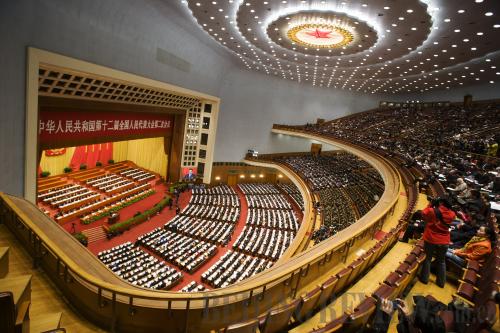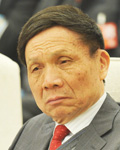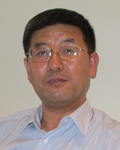Government work under microscope
 0 Comment(s)
0 Comment(s) Print
Print E-mail Beijing Review, March 10, 2014
E-mail Beijing Review, March 10, 2014
|
|
|
The Second Session of the 12th National People's Congress opens at the Great Hall of the People on March 5 (WANG XIANG) |
Chinese Premier Li Keqiang delivered the government's annual work report during the opening meeting of the Second Session of the 12th National People's Congress (NPC)—China's top legislature—in Beijing on March 5. Beijing Review reporters Zhou Xiaoyan, Deng Yaqing, Zeng Wenhui, Miao Xiaoyang and Hou Weili spoke to NPC deputies and members of the 12th National Committee of the Chinese People's Political Consultative Conference (CPPCC)—China's top political advisory body—to hear their viewpoints on topics covered in the report. Edited Excerpts follow:
|
|
|
Xu Shousheng, NPC deputy, Secretary of Communist Party of China Hunan Provincial Committee |
Deepening reform
The government work report reflects the fresh mindset held by the new leadership on how to govern the country. It's a pragmatic and inspiring report, which accurately addresses all of the problems that are of deep concern to Chinese citizens. As for the obstacles in the way of China's future reform, the report doesn't avoid talking about them or attempt to cover them up. It specifically lists all the problems and spells out how to take on these challenges.
China's economic structural adjustment has made marked progress. The proportion for which the service industry accounts for has surpassed that of the manufacturing industry for the first time. The growth rate in the less developed central and western parts of the country was much higher than that in the richer eastern region in 2013, signaling more balanced development across the board. An array of measures have successfully helped to deepen reforms, such as using value-added tax to replace turnover tax and setting up the pilot Shanghai free trade zone. China's fast development in 2013 has proved the doomsayers wrong.
I have two suggestions. Firstly, the institutional reform in the State Council should be accelerated. Right now, certain departments under the State Council still have overlapping functions. This has led to inefficiency and a buck-passing work style. Any department that needs dismantling should be dismantled as soon as possible.
Second, the central region of China has been positioned as a transportation hub. Building such a hub requires hefty investment, which results in central provinces being heavily indebted. Such debt should be shouldered by the Central Government and local governments together rather than local governments alone.
|
|
|
Huang Boyun, NPC deputy, an academician with the Chinese Academy of Engineering |
Innovation-driven growth
Premier Li's work report has mentioned "innovation-driven growth" a lot. How exactly to marry economic and technological development and how to transform scientific achievements into productivity represent the main issues?
Progress has been made in that regard. But more needs to be done. First, stock ownership incentives should be implemented in innovation parks so that scientists can enjoy more benefits from the fruits of their research. Second, approval of innovation-related issued should be delegated to provincial governments.
|
|
|
Huang Taiyan, NPC deputy, President of Liaoning University |
Economic transformation
China can absolutely meet the GDP growth target it has set itself for 2014 but faces lots of challenges in terms of the CPI limit. Firstly, it takes time to digest the excess currency that the central bank issued to stimulate growth. Secondly, the prices of the labor, land and raw materials are constantly increasing in China.
China experienced three decades of super-fast growth at the expense of cheap labor costs. Now, it faces more restrictions from limited natural resources and an aging society. Domestic consumption should be the new growth engine.
In the past, many Chinese would buy several suitcases of luxurious products during their overseas trips. This shows Chinese people have the ability to consume, but that the domestic market presents some problems. Therefore, the core of China's economic transformation should be "made-in-China" products, and focus should be placed on their quality, branding and credibility.










Go to Forum >>0 Comment(s)